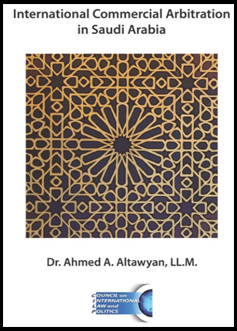Dr Ahmed A. Altawyan is a scholar and legal practitioner who is an expert in Sharia and Saudi law, as well as US and international business law. Dr Altawyan has written a new analysis of arbitration law in Saudi Arabia, and explains how new laws have aligned Saudi business law (based on Sharia) with accepted international standards.

Tim Martin holds the position of Senior International Counsel with Blakes, an international law firm, and is based in Saudi Arabia. He is also Chair of the Executive Committee & Editorial Board of the Journal of World Energy, Law & Business (Oxford University Press). He says that “If you need to know how to conduct an arbitration in the Kingdom, or how to enforce or challenge an arbitral award in the Saudi courts, this is the book for you.”
Professor Sundra Rajoo, the Director of the Kuala Lumpur Regional Centre for Arbitration, is also a fan, saying that “I consider that this book will certainly become a reference in practice and in law for future movement in this discipline. Furthermore, it will most probably be used as a source in the realm of arbitration in the Kingdom of Saudi Arabia and beyond. It is clearly written and flows well, the subject is interesting, the research is thorough and provides a true bearing on the subject.”
Dr Altawyan’s analysis is designed to help people and businesses understand how business is done in Saudi Arabia, and help them work out what to do to protect themselves and their investments. He also provides a firm historical context to help readers to understand Saudi business practices and laws. We spoke to him to find out a bit more.
Dr Altawyan, your analysis focuses on the new Saudi Arbitration Law of 2012. Did this law change a lot about how business (particularly international business) is done in the country?
The analysis is not just about the new laws; it also covers the big picture of the modernisation movement in the Saudi legal environment. To align with international standards and to facilitate the enforcement of arbitration agreements the Saudi Enforcement Law was issued in 2012, which represents a significant step in the creation of particular jurisdictions and specific procedures enabling the enforcement of agreements reached through arbitration.
Also, Article 38(1) of the Saudi Arbitration Law provides an opportunity for the arbitrating parties to agree to the laws of any state to settle their disputes, which is of great help to foreign investors in the Kingdom because they can choose the laws that are familiar to them. In addition, on October 4, 2016, the Council of Ministers established the Saudi Centre for Commercial Arbitration (SCCA), the first of its kind in Saudi Arabia, in Riyadh.
The Centre coordinates with other international arbitration centres, such as the International Centre for Dispute Resolution (ICDR), to offer specialised training for its professional staff, including case management of mediation and arbitration cases. Furthermore, the Saudi Minister of Justice has officially requested the implementation courts to stop receiving referrals on paper and to accept only electronic representations and orders.
Through this proposal to make the courts “paperless,” the Minister aims to speed up the delivery of judicial outcomes, thereby reducing the time and expenses involved in the judicial process. All of these steps have contributed to improvement in the efficiency of dispute settlement and enforcement procedures for foreign investors in Saudi Arabia.
Applying Saudi law to international commercial contracts can have consequences that may not be foreseen by a Western company – can you explain what some of these consequences can be?
The book demonstrates that international tribunals and municipals courts around the world face difficulties when resolving contractual disputes that require the interpretation of a disputed Islamic legal term or the application of Sharia Law.
Western courts and most international arbitrators face difficulties when interpreting and applying Saudi law to a contract dispute, because these tribunals cannot look at statutes, case law, or precedent to determine the Saudi law to be applied to the case, unlike in secular law.
Another challenge is that most courts and arbitrators do not have sufficient knowledge of the sacred texts, nor are they capable of performing the Ijtihad as applied in the Saudi courts to determine a legal matter under Saudi law.
As a result, understanding how Saudi courts work is critical to potential foreign investors, including the application of Sharia. Choosing the right attorney and arbitration tribunal is crucial to assisting and guiding investors in how to comply with judgements and awards as required by the legal process in the Kingdom, including at the enforcement stage.
This challenge can be surmounted, however, which puts parties who have filed for arbitration in a good position in cases where modern arbitration practices are offered (particularly in the enforcement stages of a case), and the arbitral tribunal has knowledge of both Saudi law and international practice. The SCCA provides such services to assist foreign investors.
The Centre can also benefit international business investors by helping them find the right arbitrator with the required experience to understand their case, giving them more confidence in the entire legal process.
The 2012 laws are designed to enhance provisions for arbitration as a method of dispute resolution. Does this make Saudi business law more similar to international and Western business laws?
The arbitration process of the new Saudi Arbitration Law has significant features that appear when it is compared with most international rules.
First, unlike the previous law, the new law clarifies the meanings of some terms, such as the term of the arbitration agreement. It states that the arbitration agreement is an agreement between two or more parties to refer to arbitration of all or some of the particular disputes that have occurred or might occur between the parties concerning a certain contractual relation, and whether the arbitration agreement appears as an arbitration condition mentioned in a contract or as an independent arbitration stipulation.
Under the new law there are no conditions about any particular nationality, gender, or religion, and only the chairman of the arbitration tribunal is required to have a legal or Sharia degree.
Of special significance is that the new law identifies the standards that make the arbitration international under the law, while the old law did not address to determine when to make the arbitration international.
Moreover, there is clarity and precision in dealing with technical issues that may be mixed with confusion at all stages of the arbitration process. For example, the law clearly provides the arbitration tribunal with the authority to use any technical and legal experts necessary to achieve balance among the members of the tribunal. In addition, unlike the old law, under which the court intervened during the arbitration process broadly, the court has become supportive of arbitration.
Regulating the relationship between the arbitration process and the Saudi courts was the most difficult aspects. For example, the new law does not require the adoption of the arbitration document by the court to hear the dispute, which was one of the obstacles that delayed the start of the arbitration process, because it could take the court several months to act.
How do you think arbitration law in Saudi Arabia could continue to develop and adapt to new situations?
On April 25, 2016, the Kingdom announced Vision 2030, which presents its plans for the next 15 years. One of the goals of Vision 2030 is to attract global investments from major international companies. As it is a member of the Group of Twenty (G-20) and a major producer of crude oil, the Kingdom of Saudi Arabia is an attractive environment for foreign investments in different business areas, such as energy, banking, industry, and, more recently, the retail sector.
Foreign investors prefer the method of arbitration to settle disputes between merchants, and the commercial arbitration process has become more attractive for foreign investors because of its privacy, party control of the process and the international recognition and enforcement of its awards. Saudi Arabia therefore signed the Convention on the Recognition and Enforcement of Arbitral Awards, known as the “New York Convention,” which became the legal framework for arbitration proceedings as a mode of resolving disputes within the Kingdom. In addition the new arbitration law was introduced, inspired by the UNCITRAL Model Law. All these big steps will attract international investment to the country.


